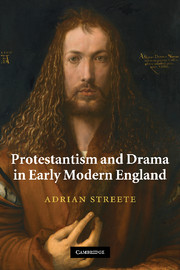Book contents
Introduction
Published online by Cambridge University Press: 11 March 2010
Summary
O that thou shouldst give dust a tongue/ To crie to thee/ And then not heare it crying!
(George Herbert)One could say that Martin Luther was the first great antihumanist: modern subjectivity is announced not in the Renaissance humanist celebration of man as the ‘crown of creation’, that is, in the tradition of Erasmus and others (to whom Luther cannot but appear as a ‘barbarian’), but, rather, in Luther's famous statement that man is the excrement that fell out of God's anus. Modern subjectivity has nothing to do with the notion of man as the highest creature in the ‘Great Chain of Being’, as the final point of the evolution of the universe: modern subjectivity emerges when the subject perceives himself as ‘out of joint’, as excluded from the ‘order of things’, from the positive order of entities (Slavoj Žižek).
In a book called The Christians Apparelling By Christ published in 1625, the Protestant writer Robert Jenison offers this interesting piece of advice to his readers: ‘know, that the thing which laies hold of Christ, applies and puts him on, is Faith, and not feeling, and that therefore thou mayest hold him fast enough though thou feelest him not’. Immediately noticeable here is the dichotomy between faith and feeling. Indeed, for Jenison, to have faith in Christ is not to feel him at all. To modern ears this may sound like a strange sentiment, perhaps even a paradoxical one: is it possible to have faith without feeling?
- Type
- Chapter
- Information
- Protestantism and Drama in Early Modern England , pp. 1 - 30Publisher: Cambridge University PressPrint publication year: 2009



